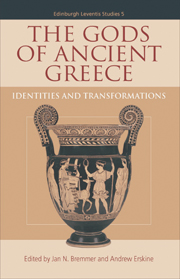Book contents
- Frontmatter
- Contents
- Preface
- List of Illustrations
- Notes on Contributors
- List of Abbreviations
- Introduction: The Greek Gods in the Twentieth Century
- 1 What is a Greek God?
- PART I SYSTEMATIC ASPECTS
- 2 Canonizing the Pantheon: the Dodekatheon in Greek Religion and its Origins
- 3 Gods in Greek Inscriptions: Some Methodological Questions
- 4 Metamorphoses of Gods into Animals and Humans
- 5 Sacrificing to the Gods: Ancient Evidence and Modern Interpretations
- 6 Getting in Contact: Concepts of Human–Divine Encounter in Classical Greek Art
- 7 New Statues for Old Gods
- PART II INDIVIDUAL DIVINITIES AND HEROES
- PART III DIACHRONIC ASPECTS
- PART IV HISTORIOGRAPHY
- Epilogue
- Index
4 - Metamorphoses of Gods into Animals and Humans
from PART I - SYSTEMATIC ASPECTS
Published online by Cambridge University Press: 05 August 2013
- Frontmatter
- Contents
- Preface
- List of Illustrations
- Notes on Contributors
- List of Abbreviations
- Introduction: The Greek Gods in the Twentieth Century
- 1 What is a Greek God?
- PART I SYSTEMATIC ASPECTS
- 2 Canonizing the Pantheon: the Dodekatheon in Greek Religion and its Origins
- 3 Gods in Greek Inscriptions: Some Methodological Questions
- 4 Metamorphoses of Gods into Animals and Humans
- 5 Sacrificing to the Gods: Ancient Evidence and Modern Interpretations
- 6 Getting in Contact: Concepts of Human–Divine Encounter in Classical Greek Art
- 7 New Statues for Old Gods
- PART II INDIVIDUAL DIVINITIES AND HEROES
- PART III DIACHRONIC ASPECTS
- PART IV HISTORIOGRAPHY
- Epilogue
- Index
Summary
Is the hoary old cliché ‘good to think with’ still good to think with? In my view, yes. One concept that certainly is (and was) good to think with is metamorphosis. In antiquity it was good to think with about just two things, but because those two things are nothing less than the limits of humanity and the nature of the gods, that is, I think, quite enough to be going on with.
Stories of metamorphosis which explore the limits of humanity – stories which I am not going to discuss in this chapter – narrate transformations of human beings as an alternative to death: prolongations of existence as laurel, wolf, spider, constellation. There is plenty of scope for more investigation here, for instance in relation to why certain genres play down the notion of human exit via metamorphosis, whereas others gleefully accept it; not to mention the radical differences even within a single genre – I have in mind the resolutely death- centred Iliad at one end of the epic spectrum, the much more transformation-friendly Odyssey a little further along, and, at the far end, the radically open, feverishly metamorphic world of Nonnos. There is also room for more work on the interaction between the metamorphic tradition, considered globally, and other types of belief in the perpetuability of humanity through changed, sometimes non-human forms, beliefs based on the assumed persistence of the soul after death.
- Type
- Chapter
- Information
- The Gods of Ancient GreeceIdentities and Transformations, pp. 81 - 91Publisher: Edinburgh University PressPrint publication year: 2010



